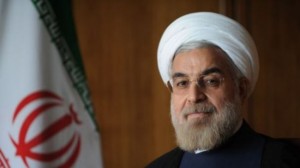 Iran's new president, Hasan Rouhani, is on a�charm�offensive�in advance of his visit to New York for the U.N. General Assembly next week. Most recently in an�op-ed�published Friday in the�Washington Post, he has signaled his willingness to enter new negotiations with the United States over Iran's nuclear program. And that comes as little surprise to former U.S. intelligence and national security officials, who see Rouhani as a known quantity, and someone the Americans can do business with.
Iran's new president, Hasan Rouhani, is on a�charm�offensive�in advance of his visit to New York for the U.N. General Assembly next week. Most recently in an�op-ed�published Friday in the�Washington Post, he has signaled his willingness to enter new negotiations with the United States over Iran's nuclear program. And that comes as little surprise to former U.S. intelligence and national security officials, who see Rouhani as a known quantity, and someone the Americans can do business with.Rouhani was one of the so-called "Iranian moderates" who, in May 1986, met secretly in Tehran with officials from President Reagan's National Security Council staff. The meeting was arranged largely in the hopes of enlisting the Iranians' support in winning the release of American hostages. But Reagan and his advisers also sought to improve U.S.-Iran relations generally by forging ties to pragmatists in the Iranian regime. They thought Rouhani, then a senior defense official, was one of them.
"He said many things at the time that showed he wanted to deal with us. And we could deal with them," Howard Teicher, then a senior NSC staffer who was part of the delegation that met with Rouhani, told�Foreign Policy.
It was not to be. The secret meeting was also a pivotal moment in what would soon become known to the world as the Iran-Contra affair, the covert operation that embroiled the Reagan White House in scandal and ended with the resignation of several top officials. But, says Teicher, officials were hopeful at the time for a new opening that might undermine the influence of Iran's hardline leaders.
"I left my meetings with Rouhani believing there were clearly people in the revolutionary government that saw the world and its interests in ways that were rational," Teicher said. That Rouhani is now reaching out to the Obama administration is "incredibly encouraging," he added. "He's back and he's promoting the same [initiative]. ...To not engage him very seriously, to me, would be the height of folly."
Other former intelligence officials shared the view that Rouhani is still the moderate he was in the mid-80s. "This is a pragmatic person. I don't think he has changed his stripes at all," said Paul Pillar, who served as the CIA's national intelligence officer for the Near East and Southeast Asia. "He's coming at these issues with the same attitude he has all along."
Former officials describe Rouhani as willing to forge ties with the United States at great political and personal risk. Teicher noted that Rouhani used an assumed name when he met with U.S. officials in 1986 for fear he'd be discovered by senior government officials. "Many times we thought he would end up losing his head," said Teicher, who described Rouhani as "the least bloodthirsty" of Iran's leaders.
But former officials and experts cautioned�skepticism�about whether Rouhani could make good on a new deal on nuclear weapons. And, they noted, before Iran is likely to make a substantial shift in its policies, it would need to see some relief from crippling economic sanctions imposed by the United Nations over the country's nuclear program.
"I think [Rouhani] has a reputation as a moderate. But they're really hurting with sanctions," said Amb. Joseph DeTrani, who served as the CIA's Director for East Asia and was the State Department's special envoy for the six-party talks over North Korea's nuclear program. DeTrani, like other former officials, said Iran's struggling economy is forcing Rouhani's hand as much as any predisposition he has towards pragmatism.
"We will only be able to declare a true turning point when we see what happens at the negotiating table, as opposed to the op-ed pages of the�Washington Post," said Greg Thielmann, who served as the top intelligence official at the State Department. "My own assessment, however, is that Rouhani's campaign rhetoric was indicative of a fundamentally different approach to foreign policy than his predecessor. ... There is mounting evidence that the stars are aligning for a more productive discussion with the United States over, not just Iran's nuclear program, but issues like Syria as well."
Theilman said he was particularly encouraged by�comments�from Iran's Supreme Leader, Ayatollah Ali Khamenei, that suggest the new president has the backing of the country's most powerful figure.
To the extent that Rouhani's election and his most recent statements are being greeted as a moment of opportunity, the Obama administration has a chance to reboot the U.S.-Iran relationship. White House national security official Ben Rhodes said Friday that there's no meeting "currently planned" between the two presidents. But former officials predicted a "chance" encounter in the halls outside the General Assembly next week, and said it would be a welcome step.
"The new Iranian administration has opened a door to a better relationship, and one better for the United States, about as widely as such doors ever are opened," Pillar wrote Friday in a�column�for The National Interest. "The United States would be foolish not to walk through it."
By Foreign Policy
The Iran Project is not responsible for the content of quoted articles.










